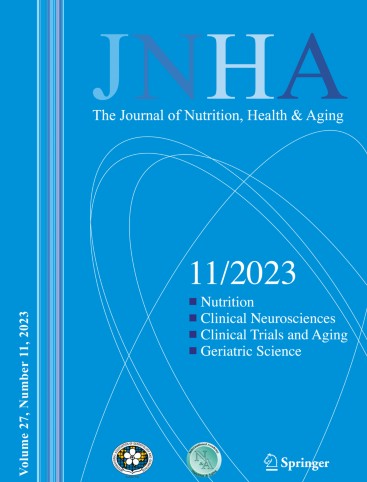牙齿脱落、饮食质量和认知能力下降:一项15年的纵向研究
IF 4.3
3区 医学
Q1 GERIATRICS & GERONTOLOGY
引用次数: 0
摘要
目的探讨牙齿脱落与轻度认知障碍(MCI)和痴呆发病率的关系,重点关注饮食质量作为潜在的中介因素。前瞻性队列研究。背景和参与者:居住在社区的老年男性参加了北爱尔兰PRIME研究(前瞻性心肌梗死流行病学研究)。一组年龄在58-71岁的男性在2001-2003年间接受了牙科检查。幸存的参与者被邀请参加2016-2020年的认知再筛查,其中包括一份食物频率问卷。根据标准化的神经认知测试,认知结果被分为正常、轻度认知障碍或痴呆。膳食多样性评分(DDS)根据食物组的摄入频率计算。分析包括多重逻辑回归,以评估牙齿脱落(定义为剩余的20颗天然牙齿)与MCI/痴呆发病率之间的关系,并对潜在的混杂因素进行调整。中介分析评估了饮食质量在这一关系中的作用。结果共纳入628例男性,平均基线年龄63.2岁(SD 2.8),中位随访时间15.0年(IQR 14.2 ~ 17.0)。在重新筛查时,485人(77.2%)认知正常,112人(17.8%)患有轻度认知障碍,31人(4.9%)患有痴呆症。在完全调整的模型中,牙齿脱落与MCI/痴呆显著相关(OR = 2.06, 95% CI 1.20-3.55, p < 0.01)。DDS部分介导了这种关系,解释了大约23%的总效应。结论:在该老年男性队列中,牙齿脱落与15年以上MCI/痴呆的发病率相关,饮食多样性部分介导了这种关联。这些发现强调了连接口腔健康、饮食质量和认知结果的重要途径。本文章由计算机程序翻译,如有差异,请以英文原文为准。
Tooth loss, diet quality, and cognitive decline: A 15-year longitudinal study
Objectives
To investigate the association between tooth loss and the incidence of mild cognitive impairment (MCI) and dementia, focusing on diet quality as a potential mediator.
Design
Prospective cohort study.
Setting and participants
Community-dwelling older men enrolled in the Northern Ireland PRIME study (Prospective Epidemiological Study of Myocardial Infarction).
Measurements
A group of men, aged 58–71 years, underwent dental examinations in 2001–2003. Surviving participants were invited to attend a cognitive rescreening in 2016–2020, which included a food frequency questionnaire. Cognitive outcomes were categorised as normal, MCI or dementia, based on standardised neurocognitive tests. Dietary diversity scores (DDS) were calculated based on the frequency of intake of food groups. Analyses included multiple logistic regression to evaluate the associations between tooth loss, defined as <20 remaining natural teeth, and MCI/dementia incidence adjusting for potential confounders. Mediation analysis assessed the role of diet quality in this relationship.
Results
A total of 628 men were included, with a mean baseline age of 63.2 years (SD 2.8) and a median follow-up of 15.0 years (IQR 14.2–17.0). At rescreening, 485 (77.2%) were cognitively normal, 112 (17.8%) had MCI, and 31 (4.9%) had dementia. In fully adjusted models, tooth loss was significantly associated with MCI/dementia (OR = 2.06, 95% CI 1.20–3.55, p < 0.01). DDS partially mediated this relationship, explaining approximately 23% of the total effect.
Conclusion
In this cohort of older men, tooth loss was associated with incidence of MCI/dementia over 15 years, and diet diversity partially mediated this association. These findings highlight an important pathway connecting oral health, dietary quality, and cognitive outcomes.
求助全文
通过发布文献求助,成功后即可免费获取论文全文。
去求助
来源期刊
CiteScore
7.80
自引率
3.40%
发文量
136
审稿时长
4-8 weeks
期刊介绍:
There is increasing scientific and clinical interest in the interactions of nutrition and health as part of the aging process. This interest is due to the important role that nutrition plays throughout the life span. This role affects the growth and development of the body during childhood, affects the risk of acute and chronic diseases, the maintenance of physiological processes and the biological process of aging. A major aim of "The Journal of Nutrition, Health & Aging" is to contribute to the improvement of knowledge regarding the relationships between nutrition and the aging process from birth to old age.

 求助内容:
求助内容: 应助结果提醒方式:
应助结果提醒方式:


